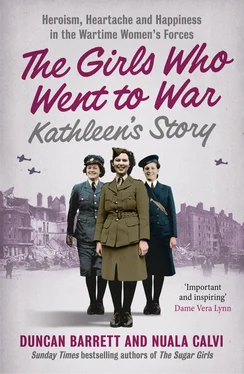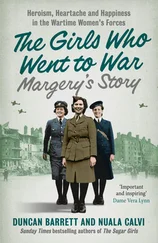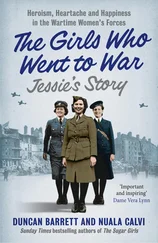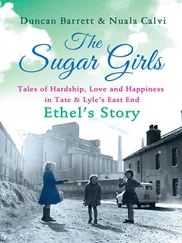Soon letters began arriving that were even more romantic than Arnold had been in person. He wrote that his heart yearned for Kathleen, that he longed to see her beautiful face again and stroke her lovely red hair. Kathleen treasured every missive, as if they were the most precious objects in the world.
Since she had first come to Tenby, Kathleen had felt as though the war was far away, but now she began to see signs of the horrors happening in the rest of the world. Strange things began washing up on the beach next to the house – sailors’ hats, foreign money and parts from naval and merchant vessels that had been sunk by German U-boats. One day she discovered a whole crate of oranges, which she and the other nannies shared among their children. Another time half a dozen boxes of toothbrushes appeared, and she took them down to the port authority in the town. She knew items of interest had to be reported, particularly if they had numbers on them that could be traced back to specific ships.
But one afternoon, a haul washed up that no one wanted to go near. Kathleen and the baby had just had lunch when she looked out of the window to see a strange tangled mess sprawled along the beach. She went outside and began to walk down the stone steps to get a closer look, but as she got nearer she realised with a start that there were around 20 human bodies strewn across the sand, all in a state of partial decomposition.
Struggling to keep down her lunch, Kathleen ran back upstairs, put the baby in her pram and rushed to the port authority to report the gruesome discovery. That afternoon the corpses were wrapped up and discreetly taken away, but Kathleen was left sickened by what she had seen.
A few weeks later, Kathleen witnessed another sight that she was unable to forget. Thanks to its large docks and nearby oil refinery, Swansea was a prime target for the Luftwaffe, and on 19 February 1941 it was hit by a ferocious bombing campaign. Over three days, 800 high explosives and more than 35,000 incendiaries fell on the city, causing raging fires, destroying its ancient centre and killing and injuring hundreds of people.
The blaze could be seen for miles around, and as Kathleen stood watching it from Tenby she felt her heart fill with fury. She knew then and there that her days as a nanny were over. She had to get out and join the fight.
She had seen a newspaper advertisement calling on women to join up with one of the three armed forces. With her love of the sea, Kathleen was particularly attracted to the idea of the WRNS, and she hoped that joining the Navy might offer the chance to visit some of the exotic places she had read about as a child. It didn’t hurt that, of all the women’s forces, the WRNS had by far the most stylish uniform.
Kathleen wrote to the address given in the paper, and soon received some forms to fill in. A week later she was invited to attend an interview at her local recruiting office. There she was grilled by a man and woman dressed in the smart blue uniforms of naval officers. They asked her about her health, qualifications and any relevant experience she might have – as well as some rather surprising queries about boyfriends and personal hygiene.
Kathleen answered the string of questions as best she could, doing her best to impress upon her interviewers how desperate she was to do her bit for her country. There was no getting around the fact that the skills she had picked up nannying weren’t exactly transferable to anything she might be expected to do as a Wren, but her obvious enthusiasm must have won them over. ‘All right, we’ll try you out,’ the woman announced at last. Kathleen couldn’t have been more thrilled.
‘You’ll have to pass a medical exam,’ the Wren officer continued, ‘but I’m sure you’ll have no trouble there. If you’re used to running around after young children you must be reasonably fit.’
The medical was to take place at a local doctor’s surgery in Tenby, and Kathleen asked her employer if she could have a few hours’ off to attend. She knew that competition for the WRNS was tough, and the medical standards for entry were high – generally only those passed as Grade I were accepted.
Kathleen was in good shape and she performed well in the physical tests, bending down, spinning around and walking along a chalk line to prove that she did not easily get giddy, and assuring the doctor that she wasn’t prone to seasickness. By the end of the examination, she felt confident that she had passed, and eagerly awaited her results.
At last the doctor came out to see her. ‘Grade I,’ he told her approvingly, looking up from a clipboard he was holding.
Kathleen jumped up from her seat, smiling, but the man put his hand out to stop her. ‘I’m afraid I can’t pass you, though,’ he said.
‘Why not?’ she demanded.
‘You’re too thin,’ the doctor replied. ‘The minimum for the WRNS is six stone, and you’re a few pounds under. I’m sorry.’
He turned and walked away with his clipboard under his arm, leaving Kathleen utterly gobsmacked. She had passed all the fitness tests, she had proved her worth. Yet for the sake of a few pounds her dream of serving in the Navy had been thwarted.
Dejectedly, Kathleen returned home and began preparing the baby’s dinner, staring longingly out of the window at the sea.
Being rejected by the WRNS had been a bitter disappointment for Kathleen, but she wasn’t going to let it stop her doing her bit for the war effort. If the Navy wouldn’t take her now, she reasoned, she would just have to find something else to do until it was ready for her.
She had seen posters in town calling on women to join the Land Army – ‘for a healthy, happy job’ as they put it. The pictures showed girls standing in golden fields of corn, tilling the soil, gathering hay and tending to cute farm animals. The life of a land girl looked distinctly appealing, and even if the work was hard, the camaraderie would surely make up for that.
Kathleen handed in her notice with the family she was nannying for in Wales, telling them she was going back home to Cambridge. She was sorry to say goodbye to the little girl she had been looking after, but she felt it was for the best. The child was beginning to grow so attached to her that many people seeing them out together assumed she was her mother.
Once she got home, Kathleen lost no time in presenting herself at a recruiting centre, where she was interviewed by a rather superior woman who wanted to know if she had a farming background.
‘Well, I used to help my father grow vegetables in the garden,’ she replied, hopefully.
‘Horticulture for you then,’ the woman declared. ‘You’ll get your call-up soon, so be ready.’
A week later, Kathleen was on the train to Bury St Edmunds, ready to take up her first posting. She arrived at the station to find a rather luxurious-looking car waiting for her, along with a chauffeur who introduced himself as Bradley. ‘I’ve been sent to collect you,’ he explained.
Kathleen got in, wondering what kind of farm had its own chauffeur. They headed out into the countryside for a while, before turning up the gravel drive of a grand mansion, whose once carefully manicured gardens had been given over to food production.
A dumpy woman with rosy cheeks and white hair met Kathleen at the door. She looked awkwardly at her, as if she didn’t quite know how to address her. ‘I’m Mrs Jones, the cook,’ she said, shaking Kathleen’s hand and half-curtseying at the same time. ‘I’ll take you up to yer room.’
‘Thank you,’ Kathleen replied, following the other woman into the house. She admired the magnificent entrance hall and the broad, sweeping staircase carpeted in red velvet. Kathleen had imagined the land girls would all bunk together in a barn, sleeping on bundles of hay, yet it sounded as if she was to have her own bedroom, right inside the grand house itself.
Читать дальше












